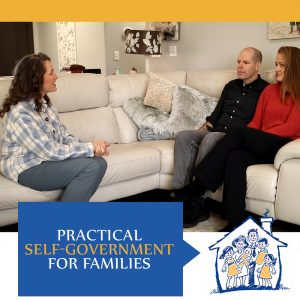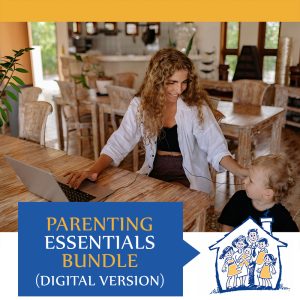Raising Independent Children
Freedom in the family is the key to raising children who are freer and more independent. The problem is, most people don’t understand freedom. Many families institute complete license without consequences assuming that’s freedom and that it will lead to independent children. But in reality, it leads to emotional bondage and relationship dysfunction. Personal freedom and independence are nurtured best by increasing responsibility based on an understanding of family roles, good communication, and strong family relationships.
Indications of Bondage
We live in a time of victims. Children and adults have never been so disempowered as they are currently. Please don’t confuse anger with empowerment. There’s a lot of anger these days, but anger isn’t power. In fact, it’s often a sign of emotional bondage. When a person can’t solve their problems without leading with emotions, the person feels powerless and fragile — not powerful and hopeful for solutions. This emotional disempowerment is leading to widespread victimhood.
Not only are some children and emerging adults not feeling powerful enough to solve their problems, but there’s also a widespread fragility that’s creating youth who don’t want to take risks. This often hampers their ability to learn basic adult skills. When adult skills aren’t learned, children suffer from increased depression and often experience a failure to launch into adulthood.
Essentially, children, teens and young adults are suffering from a lack of direction caused by an identity crisis. This is a new social phenomenon. Children used to be secure in who they were, they used to feel secure in their families, and they used to feel secure in their futures — far more than they do nowadays.
3 Keys for Raising Independent Children
Key 1: They need to know who they are and where they’re going.
Confusion stops action. That is a principle. If a person makes a long, overwhelming list of all the things he wants to accomplish in a year, then the first thing he does is likely little to nothing if he hasn’t carefully pondered and prioritized those tasks. So many of our youth are taking action in their relationships before they even know where they’re going. Taking action without vision only leads to frustration and confusion.
Understanding family roles is essential to a feeling of safety and motivation in the home. For instance, what’s the role of a 10-year-old? What’s the role of mother or father? Roles are not responsibilities (as some people mistakenly assume they are). Roles are who we are to the other people around us. They are our deepest most self-evident identities. Imagine the freedom that comes to a child who knows that his role in the family is to be a learner or an apprentice adult. Chores and corrections don’t appear as emotional when the child knows they’re just part of the learning for the learner. No one has to take the learning moments personally if people embrace their roles. Imagine what freedom comes to a mother who realizes one of her main roles is to nurture others through teaching and training. Then this mother doesn’t need to resent the daily teaching moments that must occur. Instead, she can happily embrace them and serve her family with a selfless heart. Families are the best places to learn who we are.
Acknowledging roles launches the family into another liberating realm; the realm of purpose, or knowing where each family member is going. When families know who they are, they automatically start seeing the parent roles as desired roles for their future lives. Famiies also see the family as a group that has momentum. A wise family takes the time to get everyone on the same page about what the purpose of the family is and where these family relationships are going long term. This can be accomplished by frequent, deliberate family and individual communication.
Obviously, creating full family momentum and purpose can be increasingly difficult for children who travel from home to home regularly due to fractured family relationships. Parents need to take very deliberate action when the children are with them to create family direction and identity.
My book, “Roles: The Secret to Family Business and Social Success,” is a great resource for teaching the family about roles and getting everyone moving and staying in a positive direction.
Key 2: They need strong, safe family relationships.
Parents are stressed out and resorting to manipulation more and more. Children need the home to be the safest place to make mistakes. They need parents to not take things personally and emotionally. Children need good leadership to become good leaders themselves one day.
And, even if they never really lead others, they will always need to lead themselves. With the influx of depression, anxiety and suicide, children must be empowered to lead themselves away from destructive thoughts and toward productive, empowering thoughts.
One way parents can create strong, safe family relationships is by teaching children the exact words they will use when correcting problems. This predictability in communication helps everyone be less emotional and preserves the roles. When people are more deliberate in their communications, it always leads to more freedom. Since freedom is a principle, it must governed by order. This order helps others experience the peace that comes from truly free communication.
My other book, “Parenting A House United,” gives detailed skills, or words, to use when correcting problems at home. These skills help parents and children feel prepared to make necessary changes without emotional intrusions, thus drastically reducing family disconnection and selfishness.
Key 3: They need to learn to take responsibility.
For full freedom, children need confidence. Confidence comes from learning adult skills like tasks, problem-solving, and communication skills. We need to allow our children to grow up quicker by teaching them important confidence-building skills; skills like following instructions, accepting “No” answers, accepting consequences, and disagreeing appropriately. They also need to learn to work and communicate openly to all people (especially to adults).These skills can be taught through an enriching and empowering family culture, which includes family work times and planned family meetings and activities.
Since every action and thought affects other family members, the family is the perfect environment to take responsibility. In real life, everything we do affects our societies. The family is the perfect small society to learn the impact we all have on others, and the power of our decisions and influences.
Our societies will become freer as our children become more independent, which includes the ability to self-govern themselves. Families are that power in society. We literally teach — through roles, relationships and responsibilities — how we want the next generation of youth to one day lead society. I wonder if we would all be just a bit more deliberate if we truly realized our children’s freedom, as well as our own, rests on the freedom taught at home.
For additional help with teaching children to bond and communicate better with family, parents can attend the next Teaching Self-Government Parenting Mastery Training in Lehi, UT July 11-13, 2019. See details here.
Index
- Analyzing, Anxiety, Assertive Communication, Calm, Character Building, Correcting, Culture, Disagreeing Appropriately, Encouragement, Family Culture, Family Unity, Following Instructions, Group Problem Solving, Mission, Mission Statement, No Answers, Praise, Pre-Teach, Problem Solving, Relationships, Roles, Seek to Understand, Skills, Social Skills, Structure, Tone, Work Ethic






